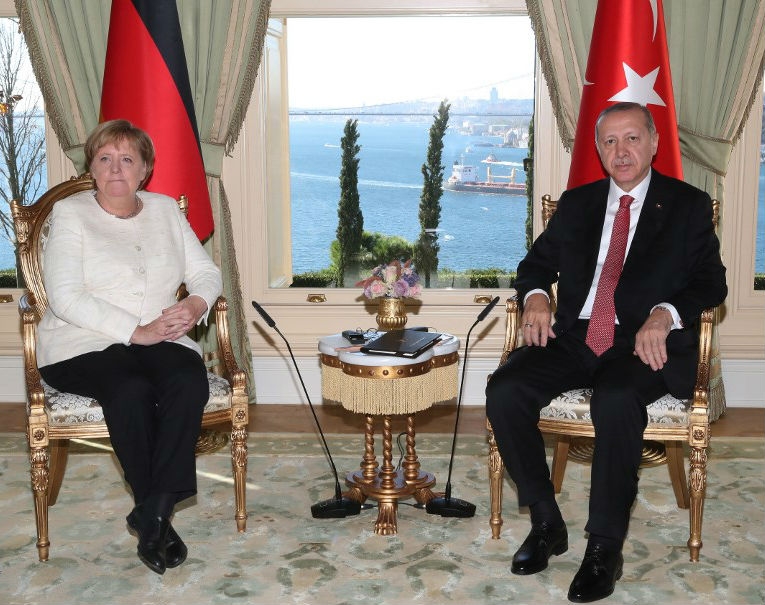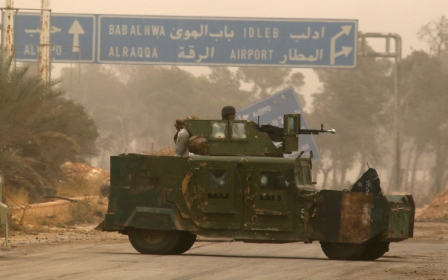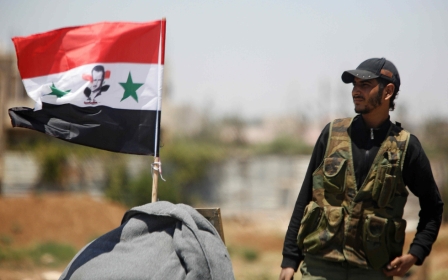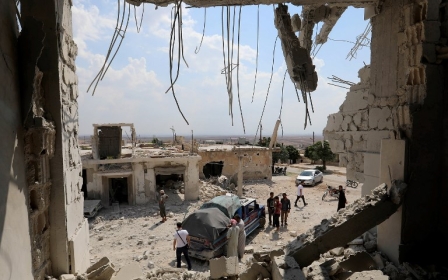Turkey hosts Syria summit with Russian, French and German leaders

The leaders of Russia, France and Germany held a four-nation summit in Istanbul on Saturday aiming to find a lasting political solution to the Syrian civil war and salvage a fragile ceasefire in a rebel-held northwestern province.
Turkish President Recep Tayyip Erdogan hosted Russian President Vladimir Putin, France's President Emmanuel Macron and German Chancellor Angela Merkel on Saturday for talks on the conflict, in which more than 360,000 people have been killed since 2011.
"The eyes of the world are on us today... I hope we will act with a sincere and constructive understanding and will not fail to meet their expectations," Erdogan said as he opened the summit in Istanbul.
After arriving in Istanbul, Macron tweeted that what was at stake was averting a "new humanitarian disaster".
The summit took place in the aftermath of Saudi journalist Jamal Khashoggi's murder in the Saudi consulate in Istanbul on 2 October.
Turkish media reported that Erdogan would also discuss the crisis in one-on-one talks with leaders on the summit's sidelines.
Macron and Merkel said on Saturday that they "want to coordinate at a European level on sanctions" on arms sales to Saudi Arabia following Khashoggi's killing, the French presidency said in a statement after the two European leaders met on the sidelines of the Istanbul summit.
While Merkel vowed on Monday to halt German weapons exports to Saudi Arabia until Khashoggi's killing - which she called a "monstrosity" - was properly investigated, other European countries have been more ambivalent in their positions.
The summit comes a day after seven civilians were killed by Syrian regime fire in the last major rebel-held bastion of Idlib, according to the Syrian Observatory for Human Rights, the highest death toll since a ceasefire was reached there last month.
Russia, which supports Syrian President Bashar al-Assad, and Turkey, which backs the rebels, agreed to create a buffer zone around Idlib last month, but violence has escalated dramatically in the lead-up to the summit.
Turkey and Russia have previously held talks with Iran on the Syrian conflict in efforts that have often been greeted with suspicion in the West, but Saturday's summit will be the first to include the European Union's two most significant national leaders.
Erdogan met briefly with Merkel, Putin and Macron before the summit, and the four leaders are expected to issue a joint statement ahead of individual press conferences, AFP news agency reported.
Turkish presidential spokesman Ibrahim Kalin said on Friday that the primary goal was to "clarify the steps to be taken for a political solution and to determine a roadmap".
Forming a commission to create Syria's post-war constitution, seen as a stepping stone to elections in the war-torn country, would be a particular point of emphasis, Kalin told Turkish state-run news agency Anadolu.
A United Nations plan for a committee to draft a new constitution ran aground this week after Damascus blocked the proposal, provoking anger among Western powers.
UN special envoy Staffan de Mistura, who attended the Istanbul summit a month before his recently announced departure, has said the Syrian government would not accept a role for the United Nations in selecting a list for the committee.
Idlib ceasefire extension
The Istanbul talks reportedly discussed extending the ceasefire around Idlib, where aid groups have warned that a military offensive could spark one of the worst humanitarian disasters of the seven-year war.
With an assault by government troops seeming imminent, Moscow and Ankara agreed on 17 September to create a 15-20 kilometre-wide demilitarised zone ringing Idlib, as Turkey sought to avoid an attack leading to a further influx of people across its border.
Under the deal, all heavy weapons were supposed to be removed from the buffer zone by 10 October.
Hayat Tahrir al-Sham (HTS), the alliance that is the dominant faction in Idlib, and other hardliners were supposed to leave the zone by 15 October.
But 12 days on, there is still no sign of any pullout by HTS or of the planned monitoring patrols by the deal's co-sponsors, the UK-based Observatory said.
Shelling in the area has continued intermittently and has ramped up in recent days.
On Friday, Syria's UN envoy Bashar Jaafari maintained that the buffer zone is temporary and that Idlib would eventually revert to government control.
However, France hopes to extend the ceasefire to enable aid convoys to get through to Idlib, home to three million people.
During a phone call with Putin before the summit on Saturday, Macron reiterated his objectives to "extend the ceasefire in Idlib, prohibit chemical weapons, ensure access to humanitarian aid and find a timetable for the political process," the Elysee palace said.
'Modest expectations'
The participants talked down hopes of a long-term solution ahead of the summit, with France speaking of "modest expectations" and Putin's spokesman Dmitry Peskov urging all sides to be "realistic".
Peskov said "the issue of the day is to reconcile different formats in order to synchronise our watches, to negotiate, and to attempt to identify common topics".
Syria's opposition, which has previously described Russia's military intervention in 2015 as an occupation, on Friday said it welcomed dialogue with Moscow, signalling readiness for more concessions following the Assad government's battlefield successes.
Meanwhile German Defence Minister Ursula von der Leyen said that "reconstruction to the profit of the dictatorship of Assad is not conceivable".
"There will be only investment into Syria if there is a satisfying political process that includes all parties," she told a security conference in Bahrain on Saturday.
At the same conference, US Defence Secretary Jim Mattis said Russia was no replacement for the United States.
"Russia's presence in the region cannot replace the long-standing, enduring, and transparent US commitment to the Middle East," Mattis said.
New MEE newsletter: Jerusalem Dispatch
Sign up to get the latest insights and analysis on Israel-Palestine, alongside Turkey Unpacked and other MEE newsletters
Middle East Eye delivers independent and unrivalled coverage and analysis of the Middle East, North Africa and beyond. To learn more about republishing this content and the associated fees, please fill out this form. More about MEE can be found here.




